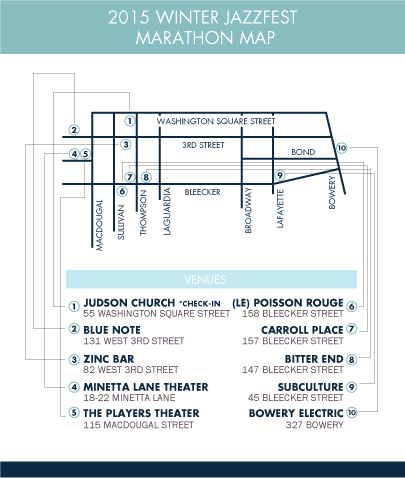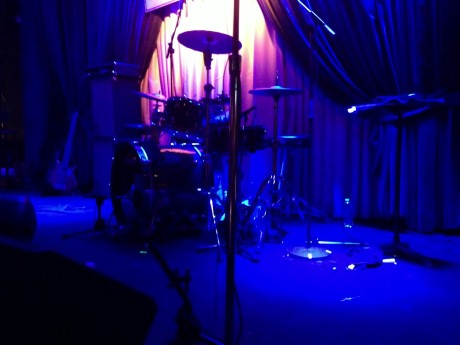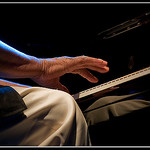
Winter is finally settling in to New York City, which means a lot of things. It’s getting dark earlier, we’ve already been hit with one cold snap with more definitely on the way, and snow is inevitable sooner or later. But one of the bright spots in the otherwise dark days of January is the Winter Jazz Fest, which is returning for the 11th year in 2015 from the 8th to the 10th. We profiled Suga’ guests (and a few others) appearing at the fest last year and will do the same as we get closer, but the preliminary line-up has been announced, so it’s worth taking a quick look at what’s going on and a preliminary peek at who’s there, although they’re promising more additions to the line-up and it will probably take even longer to get a full sense of all the side players in the groups.
Schedule and Tickets
The schedule kicks off with two different concerts on Thursday, January 8th. The Robert Glasper Trio, Jose James, Derrick Hodge, and Kendrick Scott are the headliners in a celebration of the legendary Blue Note Records label at Le Poisson Rouge. Single event tickets are $25 in advance ($30 at the door) or a $75 pass for admission to the entire festival. Meanwhile, a fundraiser concert for the Disability Pride organization will take place at the Friends Meeting Hall in Manhattan. It features a sizable list of performers and tickets go for $100 or $145 with a 3-day WJF pass. There are a variety of different ticket combos, ranging from $35 for Friday or Saturday night, to $55 for both, and up for packages with the Thursday night events. It’s a reasonable cost considering the vast array of top performers who will be there. Sets generally run from 6 PM until 2 AM (at Zinc Bar) on Friday and Saturday nights, so it’s entirely reasonable to catch 3-4 full sets of music per night if one wants to, even with overlaps.
Locations

The WJF continues around several locations in Greenwich Village and the East Village, with Judson Memorial Church again serving as the epicenter (and the festival’s box office and check-in site) and one of the larger venues. Zinc Bar and Le Poisson Rouge return as venues, joined by the Greenwich House Music School, Minetta Lane Theater, Players Theater, Bitter End, Carroll Place, Subculture, and Bowery Electric. Subculture and Bowery Electric are further away from most of the venues, which are clustered around Washington Square Park. Keep this in mind as you scan the schedule: you may be walking fast to shuttle between venues if one place you want to hit is on the east side.
The festival has become almost a victim of its own success over the years: two years ago it sold out and there have been regular problems with space in the smaller venues on the list. It’s virtually impossible to get into Zinc Bar after the early evening, for example, especially when festival goers combine with the usual Zinc crowd. Securing Minetta Lane and Players Theatre should help immensely in this regard, since both are larger spaces. Still, if one of the acts you want to catch is at one of the smaller spaces on the list, there isn’t much recourse other than to get there very early — and perhaps be prepared to wait. It likely reflects a compromise between supporting some of the smaller venues that program jazz throughout the year in more intimate spaces and the reality that the festival is drawing more people — a good thing — to see the more popular acts. There’s probably not a better fix for the issue.
Lineup
We’ll do a follow-up with a “cheat sheet” of picks on our radar, but rather than post their extensive list (WJF claims over 100 acts and counting), I’ll point you toward the artist line-up and the list of personnel, the latter of which gives a fuller sense of who’s behind some of the groups. It’s an impressive list that leans toward the experimental end of the jazz spectrum — indeed, some of the acts will probably push the boundaries of jazz — but with the variety of performers there should be something for a broad spectrum of fans. There’s a pretty thoughtful mix of vocalists and instrumental groups and there’s a diversity of styles. If you have favorites (which is likely if you’ve been following the music scene for a while), then dive in and check for people you want to see. If not, you could do worse than to just sample a few different acts that look interesting and explore. Indeed, that’s advice that goes for anyone since there are quite a few composite groups that pop up for the event and give a chance to see players that don’t always perform together try new things. There are a few ways to get a handle on what you’re likely to hear and who to catch:
Next week, we’ll take a look at a few of the artists profiled on the Suga’ in My Bowl show who’ll be there and some others we’re looking forward to seeing. Are you heading to the WJF? What are some of the acts you’re looking forward to seeing? Let us know in the comments.
Hank Williams is an associate producer for Suga’ in My Bowl on WBAI Radio and webmaster for the Suga’ and Behind the Mic sites. He is also a PhD candidate in English and Africana Studies at the CUNY Graduate Center and teaches at Hunter and Lehman Colleges and The City College of New York.

 Gayle then switched to piano for the rest of the set, playing in an angular, percussive style reminiscent of Cecil Taylor. For the final part of the opening set, dancers Patricia Nicholson Parker and Miriam Parker joined Gayle onstage along with Daniel Carter on trumpet and saxophone.
Gayle then switched to piano for the rest of the set, playing in an angular, percussive style reminiscent of Cecil Taylor. For the final part of the opening set, dancers Patricia Nicholson Parker and Miriam Parker joined Gayle onstage along with Daniel Carter on trumpet and saxophone.


 Pianist
Pianist 